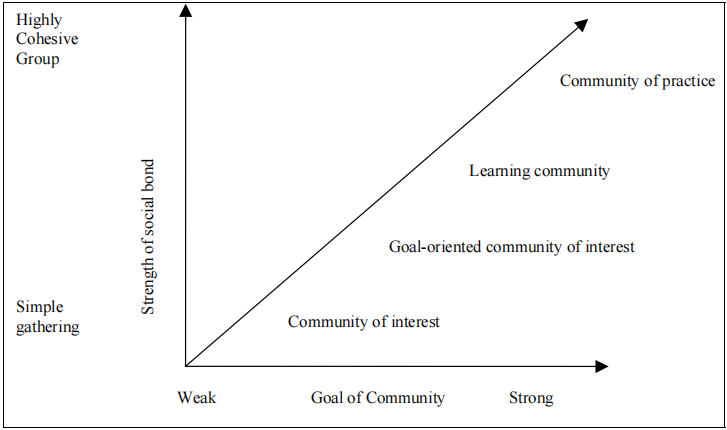30.5: Virtual (Online) Communities of Practice
- Page ID
- 90212
Virtual (online) communities play a socialization role just as “real” communities do (Henri & Pudelko, 2003). The theoretical foundation of virtual communities is based on social cognitive theory (Bandura, 1986). This theory makes several assumptions, including:
- all life experience is a social experience in various communities;
- learning can be considered as a social process, and is a process of identity construction; and
- negotiation of meaning is at the base of any individual and collective learning.
Henri & Pudelko (2003) propose three components of the social context of activity in virtual communities:
- the goal of the community,
- the methods of initial group creation, and
- the temporal evolution of both the goals and the methods of the group.
Figure \(\PageIndex{1}\) illustrates these ideas and identifies four principal types of communities:

| Community of interest | Goal-oriented community | Learning community | Community of practice | |
|---|---|---|---|---|
| Purpose | Gathering around a common topic of interest | Created to carry out a specific task | Pedagogical activity proposed by the instructor | Stems from an existing, real community of practice |
| Activity | Information exchange | Sharing of diverse perspectives and production of objects commissioned by the mandate | Participation in discussions of collective topics | Professional practice development through sharing knowledge among members |
| Learning | Knowledge construction for individual use | Knowledge construction from diverse knowledge systems towards collective use | Knowledge construction by carrying out socially situated activities | Appropriation of new practices and development of involvement |
As described here, a full CoP requires a highly cohesive group with a clear goal. A successful virtual CoP generally arises from an existing, face-to-face CoP in which professional practice is developed through sharing knowledge among members. Through this interaction, new practices may be developed and identification with the community can occur.
Table \(\PageIndex{1}\) outlines the three dimensions that characterize the community types illustrated in Figure \(\PageIndex{1}\) This shows that many types of virtual communities can exist, but not all are true CoPs.
Virtual CoPs are a recent phenomenon and studies on their effectiveness to enhance learning have not yet been done. Parboosingh (2002) advocates conducting evaluation studies that focus on how the CoP takes advantage of the technology, rather than how the technology affects the CoP.
Case Study: The SCoPE Virtual CoP (Simon Fraser University)
SCoPE, hosted by the Learning and Instructional Development Centre (LIDC) (www.lidc.sfu.ca/scope) at Simon Fraser University in Burnaby, British Columbia, Canada, is an online community for individuals who share an interest in education research and practice. The community participation in SCoPE extends beyond the university to provide opportunities for dialogue across disciplines, geographical borders, professions, levels of expertise, and education sectors.
The core activity for SCoPE is scheduled, topic-based seminars moderated by volunteers in the community. They have scheduled one seminar per month, usually three weeks in length, and have avoided overlap in the schedule. A regular format helps to build anticipation each month, encourages members to revisit the community, and also invites participation from new members who are interested in the topic.
MicroSCoPE, an online monthly update on community and member activities, is distributed to members. This newsletter includes upcoming events, a recap of past events, and information about SCoPE members’ activities and achievements, such as conference presentations and awards. Any questions about the community tools that affect participation are noted and included in MicroSCoPE as well. Following each MicroSCoPE issue, there is an increase in activity on the site. However, inasmuch as a monthly newsletter contributes to a community rhythm, a SCoPE community blog (in the works) would provide more timely updates. A blog does not reach the same audience as a community newsletter, so organizers are investigating ways to produce and manage both.

